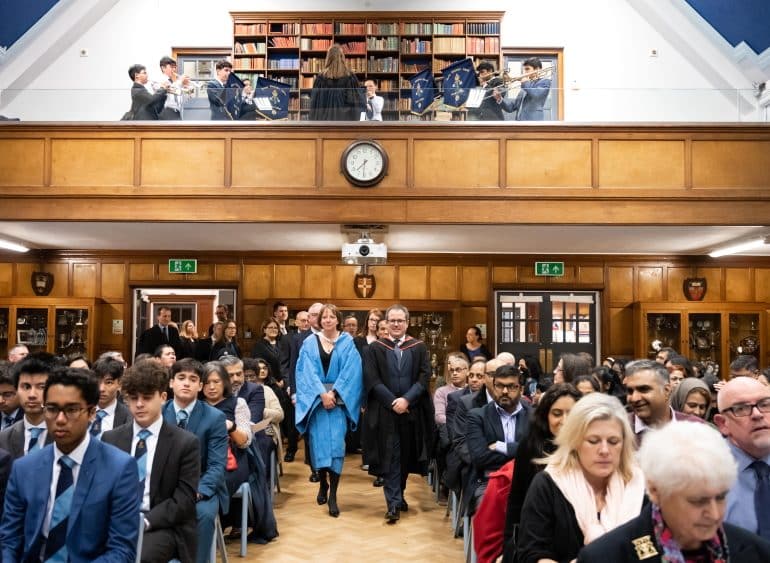
More than 60 boys received prizes for commitment and excellence across a wide field of endeavours at the 2020 Senior Awards Ceremony.
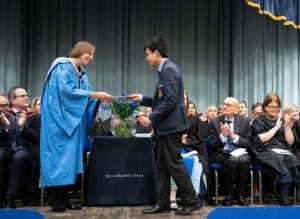 Guest speaker Professor Shearer West, Vice-Chancellor and President of the University of Nottingham, handed awards to boys from Years 10, 11 and 12.
Guest speaker Professor Shearer West, Vice-Chancellor and President of the University of Nottingham, handed awards to boys from Years 10, 11 and 12.
In a break from recent tradition, prizes were not awarded to pupils in their final year at the School. A new valediction ceremony has been instituted for Year 13 in June instead, to take place immediately following their A-level examinations.
Explaining this “conscious uncoupling” in his speech, Headmaster Neil Enright said: “This provides us with more opportunity to celebrate the achievements of the current Year 12 tonight, and a timelier juncture at which to say goodbye to those boys and their families who have reached the end of their seven years at the School.”
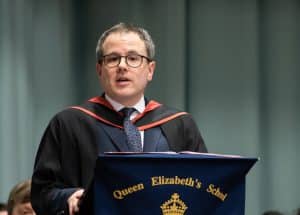 Mr Enright told the prize-winners from Years 10–12 that they should be proud not just of their performance, but also of their attitude and of their contribution to School life. “You have stood out for the levels of commitment and excellence that you have displayed over the last year – in your academic studies, the performing arts, in the sporting arena and in your service to others in this community. Your hard work and application have seen you make yourselves role models for your peers and for those younger boys in the School who look up to you.”
Mr Enright told the prize-winners from Years 10–12 that they should be proud not just of their performance, but also of their attitude and of their contribution to School life. “You have stood out for the levels of commitment and excellence that you have displayed over the last year – in your academic studies, the performing arts, in the sporting arena and in your service to others in this community. Your hard work and application have seen you make yourselves role models for your peers and for those younger boys in the School who look up to you.”
He also paid tribute to the staff, observing that their own dedication, attention and care had enabled the boys to fulfil and further extend their great potential. This potential may lead boys down many different paths, noting the different expressions of scholarship as witnessed among Old Elizabethans.
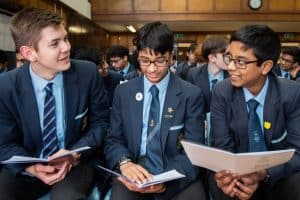 He told the boys in the audience: “I am conscious that we need to make sure that we celebrate the diverse involvements and talents of pupils throughout the School; to encourage you to follow your interests and passions, to try out new enrichment activities, and to support you to develop and communicate those new ideas and new solutions that are the evidence of the free-thinking scholarship that we hope to inculcate.”
He told the boys in the audience: “I am conscious that we need to make sure that we celebrate the diverse involvements and talents of pupils throughout the School; to encourage you to follow your interests and passions, to try out new enrichment activities, and to support you to develop and communicate those new ideas and new solutions that are the evidence of the free-thinking scholarship that we hope to inculcate.”
Scholarship could seem like a “heritage brand”, with its associations with old professors, dusty books and ancient libraries. While there was nothing wrong with any of those things, it was important to recognise that scholarship comes in many different forms, he said, spanning the sciences as well as the arts, featuring creativity and the emotional, as well as the empirical.
Mr Enright spoke of the need for young people to be able to communicate their views “away from the cauldron of social media”, to encourage independence of thought. “We need safe spaces, less to protect young people from ideas, but to allow them to try out bold new ones – to offer those new insights and new solutions.”
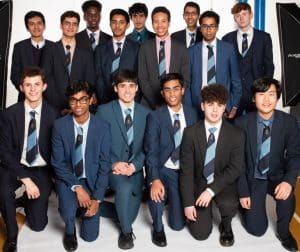 He concluded by reassuring the boys present that they were on track: “The awards you are about to collect are evidence of this. We want to ensure that you are best equipped to adapt to the modern, changing world and, perhaps, to help adapt it for the better; to help you to be open-minded, as we need to be, to the full diversity of options available to you, and to reflect and to celebrate the different expressions of scholarship and achievement as we now find them.”
He concluded by reassuring the boys present that they were on track: “The awards you are about to collect are evidence of this. We want to ensure that you are best equipped to adapt to the modern, changing world and, perhaps, to help adapt it for the better; to help you to be open-minded, as we need to be, to the full diversity of options available to you, and to reflect and to celebrate the different expressions of scholarship and achievement as we now find them.”
Guest speaker Professor West was born and raised in a small town in south-west Virginia, where her father was a factory-floor supervisor and mother a high school teacher. She was the first in her family to attend university, thus mirroring the experience of many Old Elizabethans and the aspirations of many current pupils.
She obtained her BA degree in Art History and English at the College of William and Mary in Virginia, and her PhD in Art History at St. Andrews.
Following her PhD, Professor West worked as an editor for the Grove Dictionary of Art, before taking up her first academic post at the University of Leicester. In 1996, she moved to the University of Birmingham as Head of the History of Art Department, then becoming Head of the School of Historical Studies, and Acting Head of the College of Arts and Law.
In 2008, Professor West was seconded to be Director of Research at the Arts and Humanities Research Council. She was appointed Head of the Humanities Division at Oxford in 2011, where she oversaw the launch of the Oxford Research Centre in the Humanities. In 2015, she became Provost and Deputy Vice-Chancellor at the University of Sheffield, before taking up her current post at Nottingham in 2017.
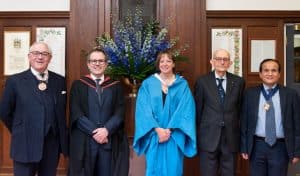 Professor West began her Senior Awards speech by quipping that she had almost, but not quite, matched QE’s School colours with her bright blue robe – noting that it was her St Andrews’ doctoral robe. She described her own journey from a community where most people worked in a factory or on tobacco farm, to her current role. “I realised that education could lift me out of a life of limited opportunity,” she said. She said her own parents had been very supportive and she stressed the importance of parents and families encouraging their children’s aspirations.
Professor West began her Senior Awards speech by quipping that she had almost, but not quite, matched QE’s School colours with her bright blue robe – noting that it was her St Andrews’ doctoral robe. She described her own journey from a community where most people worked in a factory or on tobacco farm, to her current role. “I realised that education could lift me out of a life of limited opportunity,” she said. She said her own parents had been very supportive and she stressed the importance of parents and families encouraging their children’s aspirations.
She advised boys to follow their passions: “This will set you up well! Do this and things will work out… Take me as an example. History of Art is supposed to render you unemployable, but I have had a great career!”
She adjured boys never to underestimate the value of hard work and also to consider seriously any chance to study abroad. “It’s a really great opportunity and experience. I came to St Andrews for a year as an undergraduate, returned to do my PhD and then never left the UK!”
She spoke of some of the challenges in the world today, such as climate change, AI and its potential disruption to jobs, political extremism and social media, but declared herself very hopeful that the young generation’s values of equality, diversity and service would help society address those issues.
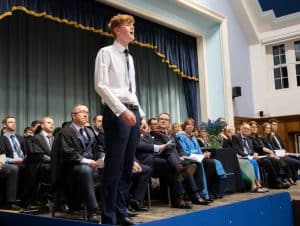 Among the guests were the Deputy Mayor of the London Borough of Barnet, Councillor Lachhya Gurung, the Deputy Mayoress, Mrs Shova Gurung, and the Representative Deputy Lieutenant of the London Borough of Barnet, Mr Martin Russell, as well as Governors.
Among the guests were the Deputy Mayor of the London Borough of Barnet, Councillor Lachhya Gurung, the Deputy Mayoress, Mrs Shova Gurung, and the Representative Deputy Lieutenant of the London Borough of Barnet, Mr Martin Russell, as well as Governors.
The evening’s proceedings were punctuated by musical interludes, which included the March from Handel’s Scipione, as well as a song, Fauré’s Au Bord de l’Eau, sung by Year 12’s George Raynor.
“The whole event was very enjoyable,” said Mr Enright afterwards. “The music was excellent – it is rare that one of the musical interludes is a vocalist, but George did very well.”
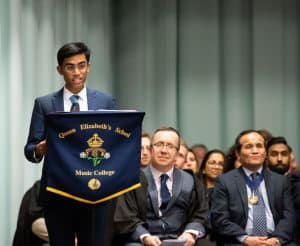 Giving the vote of thanks, School Captain Ivin Jose said: “As we sit here today, it is important for us to question how we can best contribute to our society. How can we fulfil our great potential? And how can we strive to be honest, selfless and compassionate human beings?” He asked the boys to consider: “How do we move from being gifted amateurs to active participants and game-changers?” He suggested that what they must do is to try.
Giving the vote of thanks, School Captain Ivin Jose said: “As we sit here today, it is important for us to question how we can best contribute to our society. How can we fulfil our great potential? And how can we strive to be honest, selfless and compassionate human beings?” He asked the boys to consider: “How do we move from being gifted amateurs to active participants and game-changers?” He suggested that what they must do is to try.
“Our society is not perfect, it has its fair share of flaws and problems but, maybe, all it needs is a little inspiration, a little spark of creativity from those brave enough to try. Why can’t that be us?”

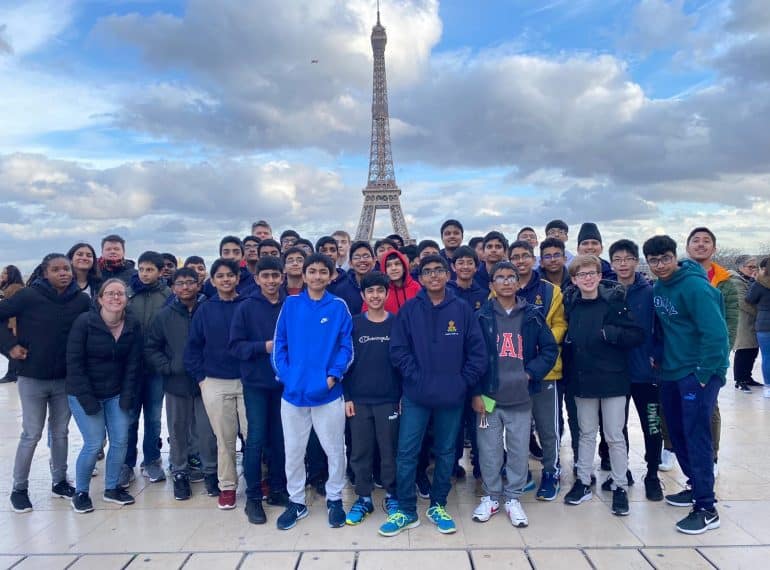
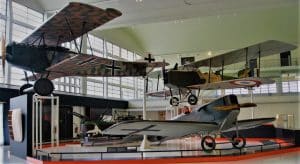 The first stopping-off point for the group was the National Air and Space Museum of France, at Paris’s historic Le Bourget, still a working airport for private flights. With nearly 20,000 exhibits, the museum features two Concordes among its 150 aeroplanes. The boys sampled the flight simulator and learned about the development of flight, from air balloons to the modern day.
The first stopping-off point for the group was the National Air and Space Museum of France, at Paris’s historic Le Bourget, still a working airport for private flights. With nearly 20,000 exhibits, the museum features two Concordes among its 150 aeroplanes. The boys sampled the flight simulator and learned about the development of flight, from air balloons to the modern day. Later, at the Cité des Sciences et de l’Industrie, the biggest science museum in Europe, the group were able to see exhibitions on themes from genetics to energy. “I found the robotics section especially fascinating as visitors could control the robots,” said Aarush. “It linked up really nicely with my personal interests at School, where I’m active with VEX Robotics.”
Later, at the Cité des Sciences et de l’Industrie, the biggest science museum in Europe, the group were able to see exhibitions on themes from genetics to energy. “I found the robotics section especially fascinating as visitors could control the robots,” said Aarush. “It linked up really nicely with my personal interests at School, where I’m active with VEX Robotics.” “The boys have been studying energy transfers in Science, and the rides have furnished knowledge which they will now have the opportunity to discuss in the classroom,” said Miss Deakin.
“The boys have been studying energy transfers in Science, and the rides have furnished knowledge which they will now have the opportunity to discuss in the classroom,” said Miss Deakin.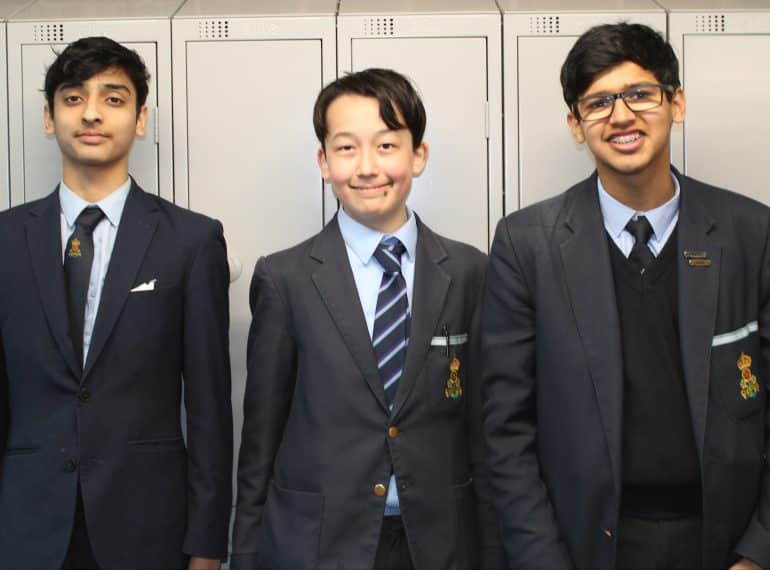
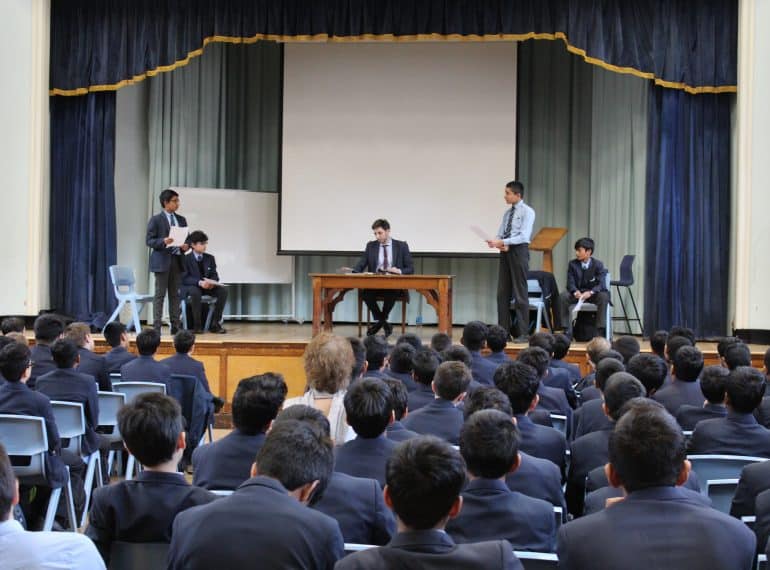
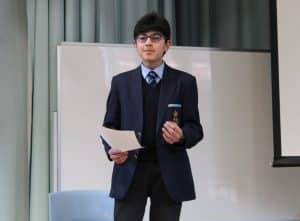 Zaki Mustafa, the first main speaker for Stapylton, presented the proposition in his allocated five minutes. He argued that freedom of speech is a pillar of democracy and a key human right, adding: “Democracy means that we decide how our country is run – the government is there to implement our decisions, not to make them.”
Zaki Mustafa, the first main speaker for Stapylton, presented the proposition in his allocated five minutes. He argued that freedom of speech is a pillar of democracy and a key human right, adding: “Democracy means that we decide how our country is run – the government is there to implement our decisions, not to make them.”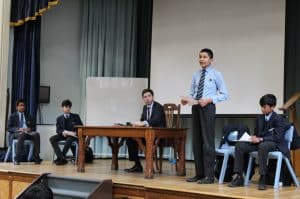 Ady added that censorship is needed in many key areas of society, including the internet, television, film and the media, and that, without censorship, children could search online for information about pornography and buying drugs. Democracy necessarily “includes censorship and we should use it to make the world a better place”, Ady concluded.
Ady added that censorship is needed in many key areas of society, including the internet, television, film and the media, and that, without censorship, children could search online for information about pornography and buying drugs. Democracy necessarily “includes censorship and we should use it to make the world a better place”, Ady concluded.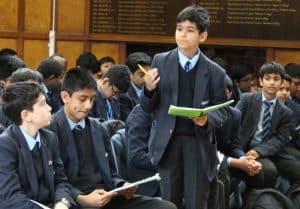 Three speakers from each side raised points or questions from the floor. For Stapylton, Joel Swedensky, Harrshiv Vyas and Akshat Bajaj touched on the importance of educating people with negative or hateful views rather than just silencing them. Leicester’s floor speakers, opposing the motion, were Abhay Halyal, Nikhil Mark and Pranav Haller, who cited as an example of the serious dangers of an absence of censorship the fact that terrorists can learn to make bombs online.
Three speakers from each side raised points or questions from the floor. For Stapylton, Joel Swedensky, Harrshiv Vyas and Akshat Bajaj touched on the importance of educating people with negative or hateful views rather than just silencing them. Leicester’s floor speakers, opposing the motion, were Abhay Halyal, Nikhil Mark and Pranav Haller, who cited as an example of the serious dangers of an absence of censorship the fact that terrorists can learn to make bombs online.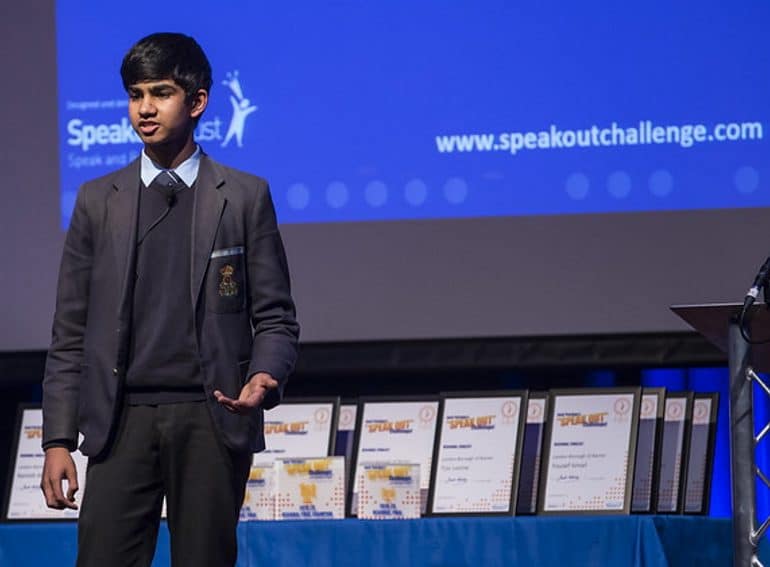
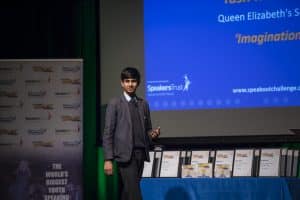 Selected from a strong field of Year 10 peers, Yash represented the School at the regional final of Jack Petchey’s Speak Out Challenge – the world’s largest speaking competition for young people.
Selected from a strong field of Year 10 peers, Yash represented the School at the regional final of Jack Petchey’s Speak Out Challenge – the world’s largest speaking competition for young people.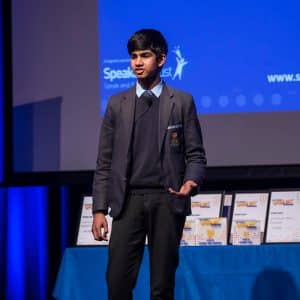 Oliver Gorman, an Extra-curricular Enrichment Tutor at QE, said: “Although he didn’t win, Yash certainly deserves plaudits for his speech and the confidence he showed in performing in front of a large crowd. He spoke brilliantly and represented himself and the School fantastically.”
Oliver Gorman, an Extra-curricular Enrichment Tutor at QE, said: “Although he didn’t win, Yash certainly deserves plaudits for his speech and the confidence he showed in performing in front of a large crowd. He spoke brilliantly and represented himself and the School fantastically.”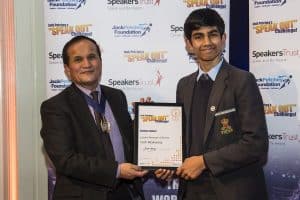 “The experience has really boosted my confidence in public-speaking, and I hope to do more of it in the future,” he said.
“The experience has really boosted my confidence in public-speaking, and I hope to do more of it in the future,” he said.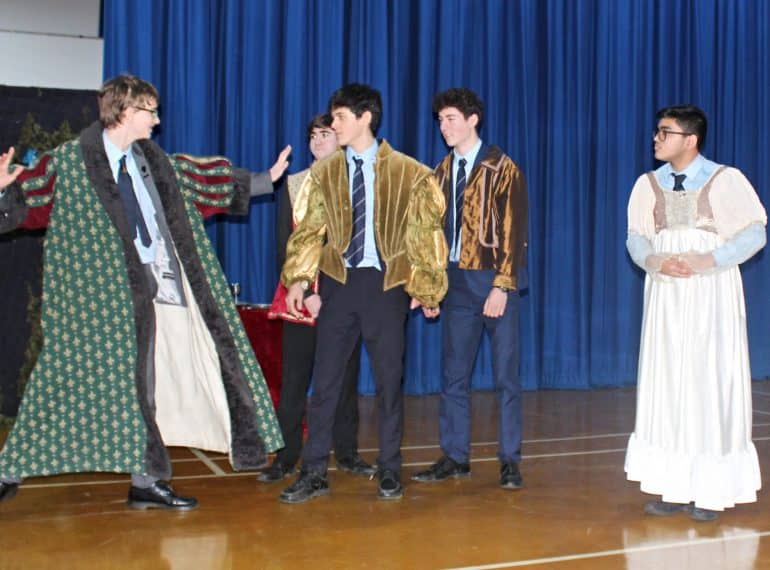
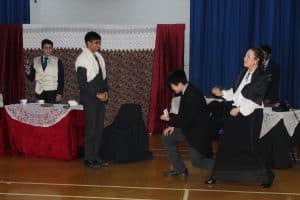 Head of English Robert Hyland said: “The majority of time in class has been spent looking closely at the linguistic and thematic features of the texts in a purely literary context. It is really important for the boys to be able to appreciate how the literary foundation of the classroom translates into the dramatic sphere of performance if they are to maximize their understanding of the texts.”
Head of English Robert Hyland said: “The majority of time in class has been spent looking closely at the linguistic and thematic features of the texts in a purely literary context. It is really important for the boys to be able to appreciate how the literary foundation of the classroom translates into the dramatic sphere of performance if they are to maximize their understanding of the texts.”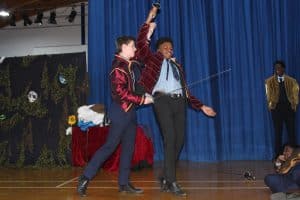 For Romeo and Juliet, an interactive staging in costume of the Capulet Ball (Act 1, Scene 5) and of the sword fight between Romeo, Mercutio and Tybalt (Act 3, Scene 1) helped show Romeo’s progression through the text, proving popular with the boys.
For Romeo and Juliet, an interactive staging in costume of the Capulet Ball (Act 1, Scene 5) and of the sword fight between Romeo, Mercutio and Tybalt (Act 3, Scene 1) helped show Romeo’s progression through the text, proving popular with the boys.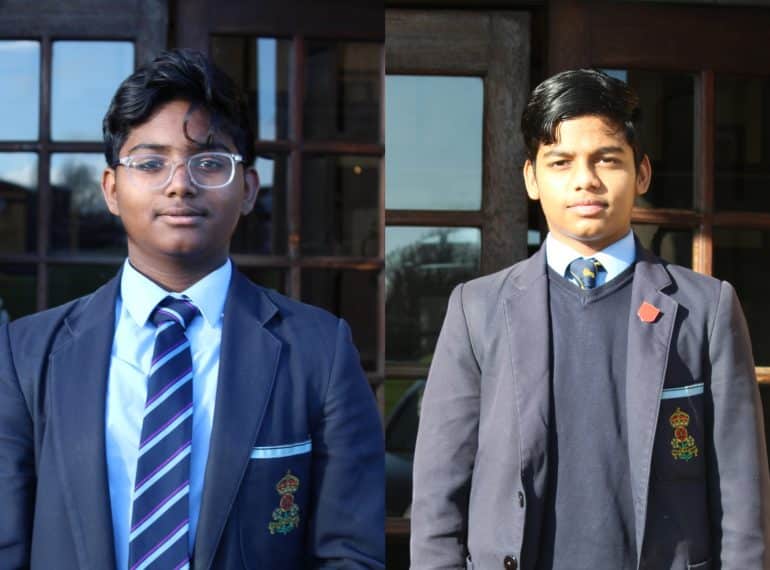
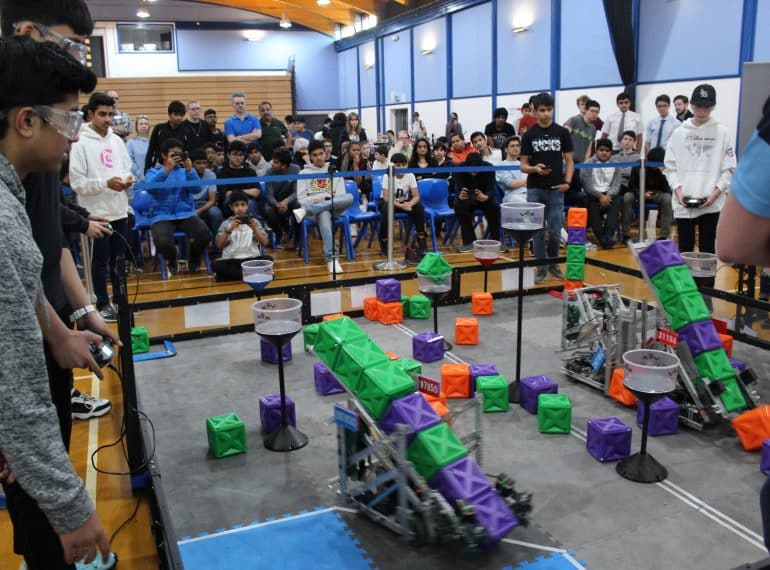
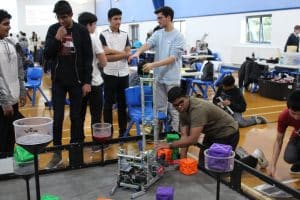 QE entered four teams: HYBRID, comprising Year 12 pupils, and SYNAPSE, ECLIPSE and Technogear, whose team members are all in Year 10 and were thus the youngest competitors in this age group.
QE entered four teams: HYBRID, comprising Year 12 pupils, and SYNAPSE, ECLIPSE and Technogear, whose team members are all in Year 10 and were thus the youngest competitors in this age group.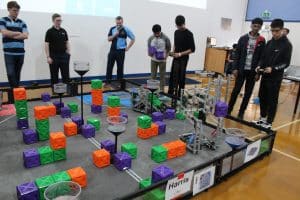 And Mark Jones, also a Design/Excellence judge said “The standard of the design and build was very good, especially with those teams that are new to the VEX and VRC competitions. The teams were knowledgeable about their robots and the processes that they had been through.”
And Mark Jones, also a Design/Excellence judge said “The standard of the design and build was very good, especially with those teams that are new to the VEX and VRC competitions. The teams were knowledgeable about their robots and the processes that they had been through.”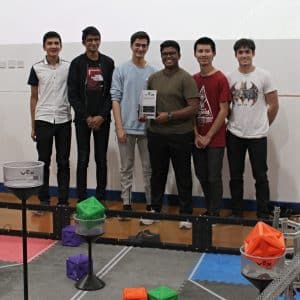 In the final round, the action started in an unexpected way, when the number one-ranked team changed their autonomous routine. This tactic proved crucial, as the scramble for cubes ended in a flurry of scoring, de-scoring and stacking of cubes in protected zones. Ultimately, the highly offensive tactics of the higher ranked alliance prevailed, with QE-JWS winning out with a score line of 65-20. The audience recognised the efforts of the teams in reaching the pinnacle of the competition, as did the judging panels.
In the final round, the action started in an unexpected way, when the number one-ranked team changed their autonomous routine. This tactic proved crucial, as the scramble for cubes ended in a flurry of scoring, de-scoring and stacking of cubes in protected zones. Ultimately, the highly offensive tactics of the higher ranked alliance prevailed, with QE-JWS winning out with a score line of 65-20. The audience recognised the efforts of the teams in reaching the pinnacle of the competition, as did the judging panels.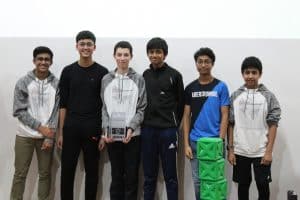 “Great credit is due to their drivers and designers, as well as their programmers for an autonomous routine which proved effective throughout,” said Mr Noonan.
“Great credit is due to their drivers and designers, as well as their programmers for an autonomous routine which proved effective throughout,” said Mr Noonan.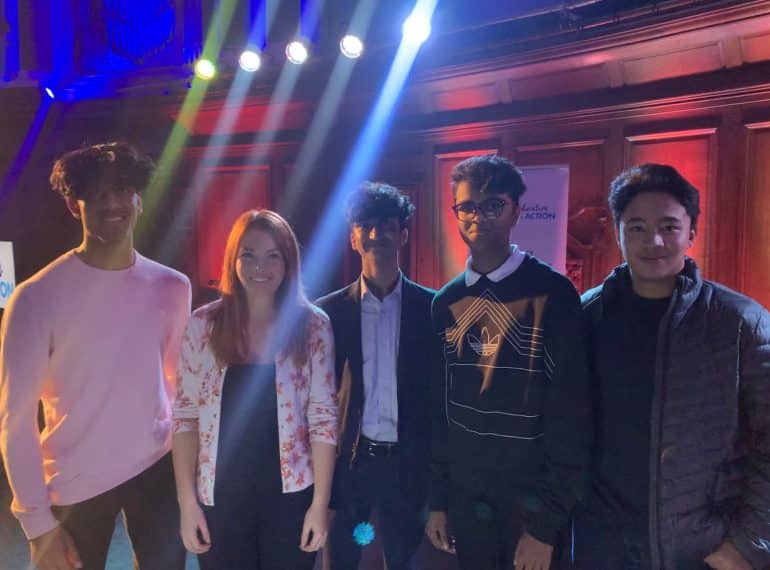
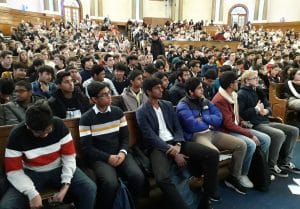 Assistant Head of Mathematics Wendy Fung said: “Each lecture was inspiring in its own way and has encouraged the boys to delve deeper into the topics they found most engaging. These lectures are a very good way of introducing branches of Mathematics and ways of mathematical thinking which are not covered as part of the A-level syllabus, and of showing the range of applications to which the subject can be applied.”
Assistant Head of Mathematics Wendy Fung said: “Each lecture was inspiring in its own way and has encouraged the boys to delve deeper into the topics they found most engaging. These lectures are a very good way of introducing branches of Mathematics and ways of mathematical thinking which are not covered as part of the A-level syllabus, and of showing the range of applications to which the subject can be applied.”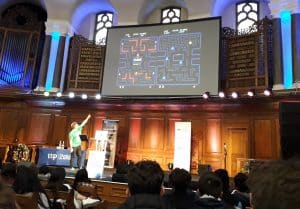 Cambridge mathematician Matthew Scroggs’ lecture on the Mathematics of Video Games impressed Charan Kumararuban, who said: “I was particularly amazed by his demonstration of using Mathematics in order to predict the shortest possible routes to complete a game of Pacman in the shortest possible time.”
Cambridge mathematician Matthew Scroggs’ lecture on the Mathematics of Video Games impressed Charan Kumararuban, who said: “I was particularly amazed by his demonstration of using Mathematics in order to predict the shortest possible routes to complete a game of Pacman in the shortest possible time.”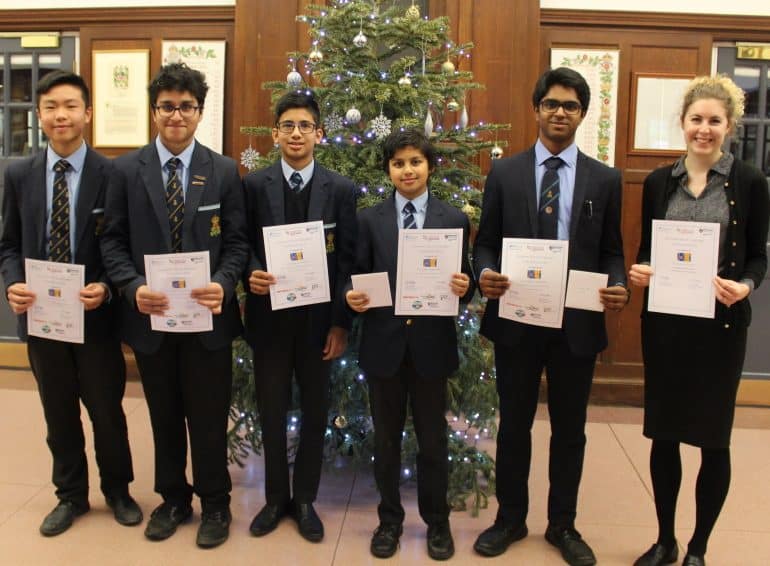
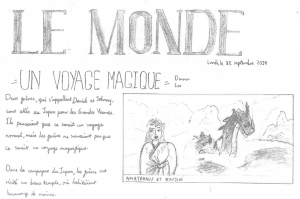 The five impressed judges with their entries for the European Day of Languages Competition, to which they were asked to submit an entry based on the theme, A Magical Trip. They were selected from among many hundreds of entries nationally.
The five impressed judges with their entries for the European Day of Languages Competition, to which they were asked to submit an entry based on the theme, A Magical Trip. They were selected from among many hundreds of entries nationally.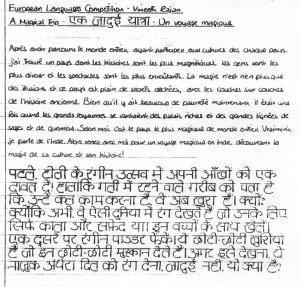 Nationally, foreign languages at school have been in decline, but QE remains committed to language-learning. All boys take at least one GCSE in French, German or Latin, and all three of these languages are available at A-level.
Nationally, foreign languages at school have been in decline, but QE remains committed to language-learning. All boys take at least one GCSE in French, German or Latin, and all three of these languages are available at A-level.